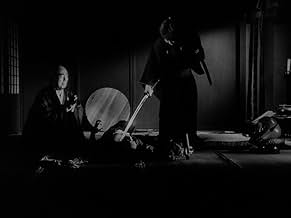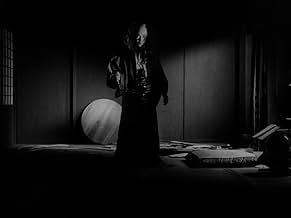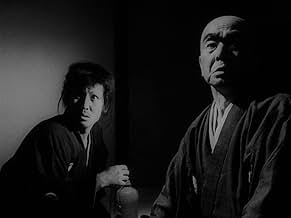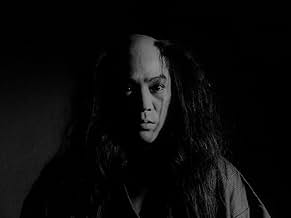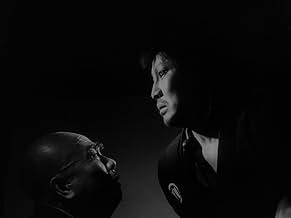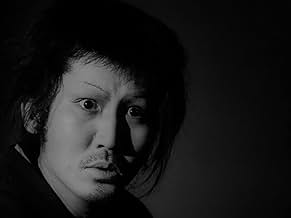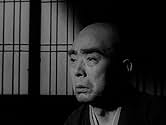AVALIAÇÃO DA IMDb
7,9/10
3,2 mil
SUA AVALIAÇÃO
Adicionar um enredo no seu idiomaAfter being robbed by a geisha, a ronin warrior carves a bloody path to seek revenge.After being robbed by a geisha, a ronin warrior carves a bloody path to seek revenge.After being robbed by a geisha, a ronin warrior carves a bloody path to seek revenge.
- Direção
- Roteiristas
- Artistas
- Direção
- Roteiristas
- Elenco e equipe completos
- Produção, bilheteria e muito mais no IMDbPro
Avaliações em destaque
It is sometime during the Edo period, and Soemon is a Ronin living under the assumed name of Gengobe in Fukugawa, Tokyo. Indebted and unable to acquire the necessary funds to join the 47 Ronin in their quest of vengeance, he spends his days drinking sake and his nights with geishas. One geisha in particular: Koman, who pledges her eternal love for him. This love proves to be fickle, for Koman is a married woman. After his servant Hachiemon acquires 100 Ryo for Soemon to join the Ronin, he is quickly swindled by Koman and her husband Sangorô. Left penniless once more, Soemon descends into a bloody spiral of insanity and violence from which he may never return.
Written and directed by Toshio Matsumoto- and based on the Kabuki play 'Kamikakete Sango Taisetsu' by Nanboku Tsuruya and Shûji Ishizawa- 'Shura' is a strikingly photographed tale of revenge and madness that plays like a samurai film noir. Containing hard-hitting violence, a cynical anti-hero and a duplicitous femme fatale, the film bears many of the hallmarks that informed the noir movement of the 40's and 50's. Told in a non-linear fashion, the narrative incorporates flashbacks, alternative scenarios and repetition, challenging and confusing the viewer. The story is a gritty, dark one, maintaining a bleak and fatalistic tone, which is only heightened by the striking cinematography from Tatsuo Suzuki.
Shot in black and white, Suzuki makes excellent, evocative use of light and shadows, creating a startling contrast that adds a sinister sense of despair and claustrophobia to proceedings. His usage of dissolves, super-impositions, angled shots and zooms heightens the narrative tension, whilst also lending the film a surreal, eerie quality that strengthens the narrative impact. Suzuki also utilises the minimalist sets- a nod to the film's origins in Kabuki theatre- masterfully, making the most of the limited spaces in an artful and imaginative way.
A frequent collaborator of Matsumoto's- working on at least three of his films, including the acclaimed 'Funeral Parade of Roses'- Suzuki was at the forefront of Japanese experimental cinema. Working alongside a variety of independent directors, Suzuki made a name for himself as an innovator in terms of cinematography and its capabilities. His avant-garde work could very well be seen as influential on, or as a forerunner to, the work of Shinya Tsukamoto, or even David Lynch. Here, he leaves the audience wide-eyed in wonder at the eerie, noiresque imagery- be it of apparent floating lamps chasing our central character or the beautiful visage of a geisha, highlighting the torment in her eyes. Throughout 'Shura,' Suzuki's efforts don't just bolster the narrative and its tone- they leave you spellbound.
As do the intense performances from the cast, most notably Katsuo Nakamura as Soemon. A former Kabuki actor, Nakamura displays his character's complex emotions and inner turmoil fantastically, utilizing expressive gestures, movements and facial expressions. He interacts with the rest of the cast convincingly, painting a compelling portrait of a man driven to madness and violence by the actions of others. Alongside him, Yasuko Sanjo delivers a masterclass in understatement as the geisha Koman. She brings much grace and elegance to the role, perhaps accrued from her years as a dancer, leaving an indelible impression on the viewer. Masao Imafuku also does fine work as the servant Hachiemon, the only real honorable one in the film; stealing every scene he's in.
Although those who shy away from violent films might not appreciate the amount of gore in 'Shura', anyone who enjoys Samurai movies, or a good revenge story, will likely be most pleased by the film. Beautifully shot by Tatsuo Suzuki and featuring commendable performances from all in the cast, there's a lot going for it. A strong narrative, deft direction- 'Shura' may be one of the best Samurai film noirs you'll ever see.
Written and directed by Toshio Matsumoto- and based on the Kabuki play 'Kamikakete Sango Taisetsu' by Nanboku Tsuruya and Shûji Ishizawa- 'Shura' is a strikingly photographed tale of revenge and madness that plays like a samurai film noir. Containing hard-hitting violence, a cynical anti-hero and a duplicitous femme fatale, the film bears many of the hallmarks that informed the noir movement of the 40's and 50's. Told in a non-linear fashion, the narrative incorporates flashbacks, alternative scenarios and repetition, challenging and confusing the viewer. The story is a gritty, dark one, maintaining a bleak and fatalistic tone, which is only heightened by the striking cinematography from Tatsuo Suzuki.
Shot in black and white, Suzuki makes excellent, evocative use of light and shadows, creating a startling contrast that adds a sinister sense of despair and claustrophobia to proceedings. His usage of dissolves, super-impositions, angled shots and zooms heightens the narrative tension, whilst also lending the film a surreal, eerie quality that strengthens the narrative impact. Suzuki also utilises the minimalist sets- a nod to the film's origins in Kabuki theatre- masterfully, making the most of the limited spaces in an artful and imaginative way.
A frequent collaborator of Matsumoto's- working on at least three of his films, including the acclaimed 'Funeral Parade of Roses'- Suzuki was at the forefront of Japanese experimental cinema. Working alongside a variety of independent directors, Suzuki made a name for himself as an innovator in terms of cinematography and its capabilities. His avant-garde work could very well be seen as influential on, or as a forerunner to, the work of Shinya Tsukamoto, or even David Lynch. Here, he leaves the audience wide-eyed in wonder at the eerie, noiresque imagery- be it of apparent floating lamps chasing our central character or the beautiful visage of a geisha, highlighting the torment in her eyes. Throughout 'Shura,' Suzuki's efforts don't just bolster the narrative and its tone- they leave you spellbound.
As do the intense performances from the cast, most notably Katsuo Nakamura as Soemon. A former Kabuki actor, Nakamura displays his character's complex emotions and inner turmoil fantastically, utilizing expressive gestures, movements and facial expressions. He interacts with the rest of the cast convincingly, painting a compelling portrait of a man driven to madness and violence by the actions of others. Alongside him, Yasuko Sanjo delivers a masterclass in understatement as the geisha Koman. She brings much grace and elegance to the role, perhaps accrued from her years as a dancer, leaving an indelible impression on the viewer. Masao Imafuku also does fine work as the servant Hachiemon, the only real honorable one in the film; stealing every scene he's in.
Although those who shy away from violent films might not appreciate the amount of gore in 'Shura', anyone who enjoys Samurai movies, or a good revenge story, will likely be most pleased by the film. Beautifully shot by Tatsuo Suzuki and featuring commendable performances from all in the cast, there's a lot going for it. A strong narrative, deft direction- 'Shura' may be one of the best Samurai film noirs you'll ever see.
'Shura' also known as 'Demons' or 'maybe even better known as 'Pandemonium' is second feature by great experimenter Toshio Matsumoto. It is one of the most experimental samurai films I have ever seen, and one of the most disturbing revenge stories. The film begins with colorful sun setting to transform into bleak black and white cinematography. After a geisha deceives a samurai and robs him together with her husband, the samurai starts the bloody and twisted path of revenge that unravels many secrets and treats the viewer with such twists that makes M. Night Shyamalan go green with jealousy. The film is cool mixture of classic samurai movies and film-noir with the tasty sauce of Matsumoto's experimental techniques. More straightforward and less surreal than the director's better known 'Funeral Parade of Roses'.
A very slow burn of a horror movie. I had no idea what to expect from a Japanese movie from the 1970s. I've seen very few Japanese films overall, and definitely no horror ones.
I honestly have no idea how to contextualize this one. I have absolutely no frame of reference for what I just watched. Certainly unlike any film (that I know of) that was released before this. This makes me want to watch more Japanese films, and definitely more Japanese horror. That is the mark of a great film.
I wasn't sure whether I read the genre properly for this film because the build up is not typical of the genre.
Once it gets going it does not stop. And the circular storytelling is so satisfying. I wasn't feeling this one until it gets to around the halfway point and I realized this wasn't just horror for horror's sake. Really interesting film that I want to revisit someday, probably next October.
Hopefully I'll have a more nuanced understanding of the Japanese film scene by then.
I honestly have no idea how to contextualize this one. I have absolutely no frame of reference for what I just watched. Certainly unlike any film (that I know of) that was released before this. This makes me want to watch more Japanese films, and definitely more Japanese horror. That is the mark of a great film.
I wasn't sure whether I read the genre properly for this film because the build up is not typical of the genre.
Once it gets going it does not stop. And the circular storytelling is so satisfying. I wasn't feeling this one until it gets to around the halfway point and I realized this wasn't just horror for horror's sake. Really interesting film that I want to revisit someday, probably next October.
Hopefully I'll have a more nuanced understanding of the Japanese film scene by then.
A strangely hypnotic and violent tale of greed, betrayal and revenge, this tale is a masterclass in cinematography and lighting. In fact, this has to be among the best lit films I have ever seen. Set designs are minimal and intersting and so is the story and it manages to hold the attention pretty nicely. The middle section of the film is a bit slow and that could have been worked on but otherwise it's good. The twist at the end works well. All in all, a pretty masterful work of art and a very underrated piece of samurai cinema.
A stark, desperate tale of vengeance, Shura examines the plight of Gengobe - a Ronin (Samurai without Master) - and his quest to right the wrongs done unto him. This is basically the whole plot in a nutshell, but this isn't any kind of action adventure story or pulp fiction Samurai epic, rather a philosophical and meditative examination of manipulation and a misguided affection which blinds a man from his duty and true quest. True this is a staple of Japanese cinema - but it is one which has rarely been examined quite this painfully and as unflinchingly as it is in this film.
The theatrical origins of Matsumoto's film are very evident from the onset of this bleak piece, an extremely minimalist affair, but this only adds to the feeling of entrapment and claustrophobia. Daylight is glimpsed only once (the first shot as the sun sinks from the blood-red sky - also the only shot in colour) and the story plays out over the course of several nights.
As with his previous film 'Funeral Parade of Roses' Matsumoto employs many times a 'dual reality' device replaying scenes first as the protagonist imagines, and then as it actually happens, constantly keeping the viewer unsettled, with shocking - though never gratuitous - spurts of violence which one is torn between finding sympathy with and being repulsed by.
This is a film which is easier to admire than to actually like, but it's forlorn, doomed and - literally - lightless vision means it could only be truthfully recommended to those who are fans of truly downbeat cinema. A viciously dark night of the Soul.
9/10. 1 point deducted for not showing even the slightest glimmer of hope.
The theatrical origins of Matsumoto's film are very evident from the onset of this bleak piece, an extremely minimalist affair, but this only adds to the feeling of entrapment and claustrophobia. Daylight is glimpsed only once (the first shot as the sun sinks from the blood-red sky - also the only shot in colour) and the story plays out over the course of several nights.
As with his previous film 'Funeral Parade of Roses' Matsumoto employs many times a 'dual reality' device replaying scenes first as the protagonist imagines, and then as it actually happens, constantly keeping the viewer unsettled, with shocking - though never gratuitous - spurts of violence which one is torn between finding sympathy with and being repulsed by.
This is a film which is easier to admire than to actually like, but it's forlorn, doomed and - literally - lightless vision means it could only be truthfully recommended to those who are fans of truly downbeat cinema. A viciously dark night of the Soul.
9/10. 1 point deducted for not showing even the slightest glimmer of hope.
Você sabia?
- CuriosidadesIncluded among Letterboxd's Top 250 Horror Films.
Principais escolhas
Faça login para avaliar e ver a lista de recomendações personalizadas
- How long is Demons?Fornecido pela Alexa
Detalhes
- Tempo de duração2 horas 14 minutos
- Cor
- Mixagem de som
- Proporção
- 1.37 : 1
Contribua para esta página
Sugerir uma alteração ou adicionar conteúdo ausente


